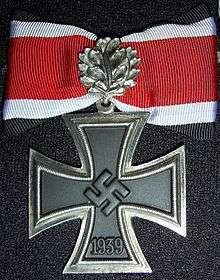Joachim Rumohr
| Joachim Rumohr | |
|---|---|
 | |
| Born | 16 August 1910 |
| Died |
11 February 1945 (aged 34) Budapest, Kingdom of Hungary |
| Allegiance |
|
| Service/branch |
|
| Years of service | 1935–45 |
| Rank | Brigadeführer |
| Service number |
NSDAP #216,161 SS #7,450 |
| Unit | 8th SS Cavalry Division Florian Geyer |
| Battles/wars | World War II |
| Awards | Knight's Cross of the Iron Cross with Oak Leaves |
Joachim Rumohr (16 August 1910 – 11 February 1945) was a high-ranking commander in the Waffen-SS of Nazi Germany during World War II. He was a recipient the Knight's Cross of the Iron Cross with Oak Leaves.
Career
Born on the 6 August 1910 in Hamburg, he joined the NSDAP and the SS in 1935 being given the party number 216,161 and the SS service number 7,450. Rumohr was first posted to the 4th Standarte as a Untersturmführer but was quickly promoted in November 1935 to Obersturmführer and posted to the Germania Regiment. In May 1938 he was the commander of the 12th Company and 9 November 1938 promoted to Hauptsturmführer in the SS-Verfügungs-Division, which would later become the 2nd SS Panzer Division Das Reich Division.
With this unit, he took part in the Polish Campaign and the Battle of France, then being given the command of the 2nd Battalion SS-Artillery Regiment Das Reich in January 1941, which he commanded for Operation Marita. On 1 June 1942 he was transferred to the SS Cavalry Division as the commander of the Artillery Regiment. On 9 November 1942 he was promoted to Obersturmbannführer and awarded with the German Cross in gold on 23 February 1943. Thereafter, he was awarded the Knight's Cross for his leadership during the winter of 1943/44 in the Kremenchug, Kirovograd areas.
On 1 April 1944 he was given the command of the 8th SS Cavalry Division Florian Geyer, being promoted to Standartenführer later the same month. He was mentioned in the Wehrmachtbericht on 9 October 1944. In November 1944 he received his last promotion to Brigadeführer and led his division during the fighting in the Budapest area for which he was awarded the Oakleaves to the Knight's Cross. Rumohr was seriously wounded during the attempt to break out from Budapest, and committed suicide on the 11 February 1945 to prevent his capture by the Soviet Red Army.
Awards
- Iron Cross (1939) 2nd Class (14 November 1939) & 1st Class (28 August 1940)[1]
- German Cross in Gold on 23 February 1943 as SS-Obersturmbannführer in Artillerie-Regiment SS-Kavillerie-Division[2]
- Knight's Cross of the Iron Cross with Oak Leaves
- Knight's Cross on 16 January 1944 as SS-Obersturmbannführer and commander of SS-Artillerie-Regiment 8 "Florian Geyer"[3]
- 721st Oak Leaves on 1 February 1945 as SS-Brigadeführer and Generalmajor of the Waffen-SS and commander of 8. SS-Kavillerie-Division "Florian Geyer"[4]
- Mentioned in the Wehrmachtbericht on 9 October 1944
References
Citations
Bibliography
- Fellgiebel, Walther-Peer (2000) [1986]. Die Träger des Ritterkreuzes des Eisernen Kreuzes 1939–1945 — Die Inhaber der höchsten Auszeichnung des Zweiten Weltkrieges aller Wehrmachtteile [The Bearers of the Knight's Cross of the Iron Cross 1939–1945 — The Owners of the Highest Award of the Second World War of all Wehrmacht Branches] (in German). Friedberg, Germany: Podzun-Pallas. ISBN 978-3-7909-0284-6.
- Patzwall, Klaus D.; Scherzer, Veit (2001). Das Deutsche Kreuz 1941 – 1945 Geschichte und Inhaber Band II [The German Cross 1941 – 1945 History and Recipients Volume 2] (in German). Norderstedt, Germany: Verlag Klaus D. Patzwall. ISBN 978-3-931533-45-8.
- Thomas, Franz (1998). Die Eichenlaubträger 1939–1945 Band 2: L–Z [The Oak Leaves Bearers 1939–1945 Volume 2: L–Z] (in German). Osnabrück, Germany: Biblio-Verlag. ISBN 978-3-7648-2300-9.

